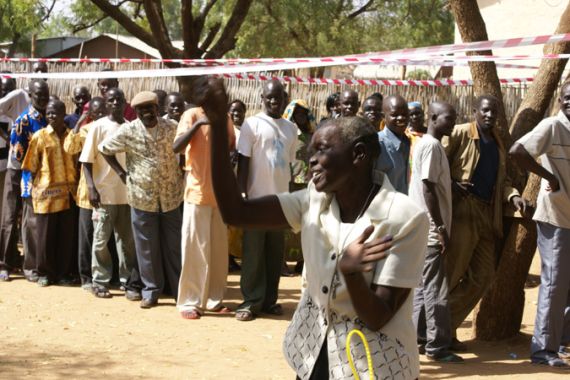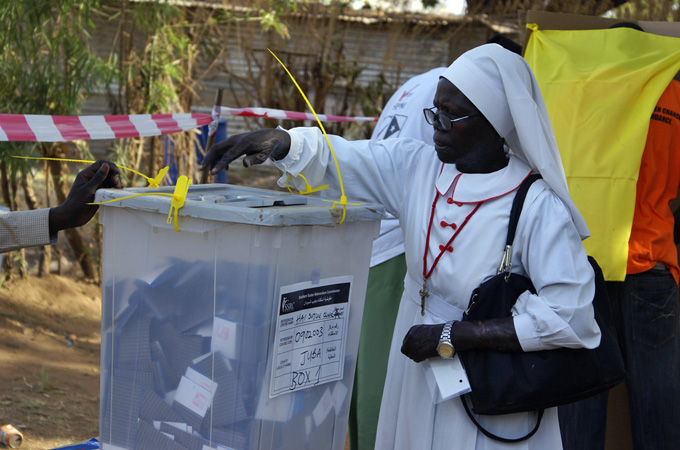South Sudanese vote for second day
As referendum on whether to split from the north continues, Khartoum ‘pledges’ to assume country’s $38bn foreign debt.

 |
| About four million voters have registered for the referendum that may lead to the partition of Sudan [Ranjit Bhaskar] |
Voting has taken place for a second day in Southern Sudan’s landmark referendum to determine whether the region will become an independent nation or continue to be part of Sudan.
Monday’s proceedings were much quieter than the first day, during which crowds thronged polling stations in Juba and other towns.
However, fresh clashes in the disputed border region of Abyei have left at least six dead. The situation in the region was tense on Monday, a local official told Al Jazeera.
Against this backdrop, Jimmy Carter, the former US president, announced that Omar al-Bashir, the Sudanese president, had assured him that the north would take on all of Sudan’s nearly $38bn debt even if the south decided to secede.
Carter, who is in the country as an international observer, said that “in a way, southern Sudan is starting with a clean sheet on debt”.
Tom Vraalsen, Norway’s special envoy to Sudan told Al Jazeera the move was “very helpful” and would “make it easier for the South Sudan government”.
“They need all our help, they are going to build a new state now from scratch,” he said.
He also praised the arrangements for the referendum.
“[The referendum] was done in an orderly manner, and I am impressed with the way the government here in Juba … prepared for this and how they conducted it.”
Polling process
More security personnel in south Sudan could be seen voting on Monday after the previous day’s heavy deployment of forces to secure Juba for dignitaries visiting to observe the beginning of the referendum.
“As many people could not vote yesterday in Juba centres, there is a proposal to extend the polling by an hour till 6pm,” Abuk Nikanora Manyok, public outreach director at the South Sudan Referendum Bureau, said.
She said the decision whether or not to extend polling hours will be taken by the South Sudan Referendum Commission in Khartoum by Monday evening.
“Women are now going from house to house to mobilise those who have not voted to go out and vote,” Manyok said.
She said voting is slowly picking up in remote areas as people have to walk long distances to reach polling centres.
The number of people who have voted will be known only towards the end of the process, Manyok said.
Al Jazeera’s Haru Mutasa, reporting from Juba, said that voter turnout of southerners in the north was very low on the first day, possibly because many people travelled to the south to vote.
Violence in Abyei
While the situation was peaceful in much of the south, 23 people were reported to have been killed in three days of deadly clashes in Abyei, the border region which is claimed by both the north and the south, according to local officials.
Charles Abyei, head of the local legislative council, told Al Jazeera that the situation was still “tense”, and that a joint security meeting was being held between authorities from neighbouring Southern Kordofan and Abyei.
The rival Misseriya Arab and Ngok Dinka peoples of the disputed territory have reported that the number of people killed in the past three days could be as high as 33.
Abyei residents are not voting in the south’s referendum.
Officials said the deadly violence involved the Arab Misseriya nomads, loyal to the Khartoum government in the north, and the Dinka Ngok tribe, which is associated with the south.
Al Jazeera’s Mohammed Vall, reporting from Abyei, said clashes in the area had been going on since Friday.
He said that at least six people from the Misseriya side were killed when they clashed with armed policemen from the Dinka side, belonging to the SPLM.
“According to our source, Misseriya people are getting ready for more clashes by way of revenge.”
Peace efforts
Our correspondent said leaders from both sides have met to calm down to situation, and make sure the unrest does not escalate into “all-out war”.
A referendum on whether Abyei should stay part of the north or join the south had been scheduled to take place in parallel with the secession vote in the south, but it has been delayed.
About 1,400 international observers are deployed across Sudan to see firsthand that the referendum passes off without any incident.
Prominent among foreign poll observers are Carter and Kofi Annan, the former UN secretary-general.
Visiting a polling station at the St Bakitha Kator Primary School in Juba, both Carter and Annan said they were impressed with conduct of the poll and the enthusiasm shown by the people.
“People have had enough of war. They want to avoid conflict,” Annan said.
Additional reporting by Ranjit Bhaskar in Juba, southern Sudan.